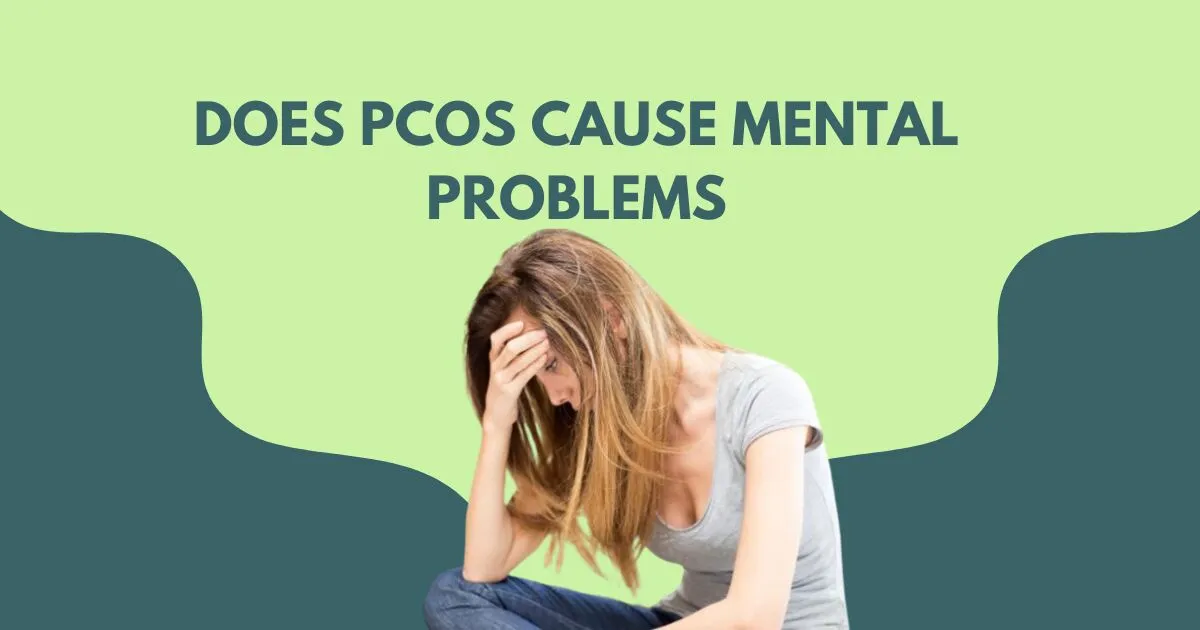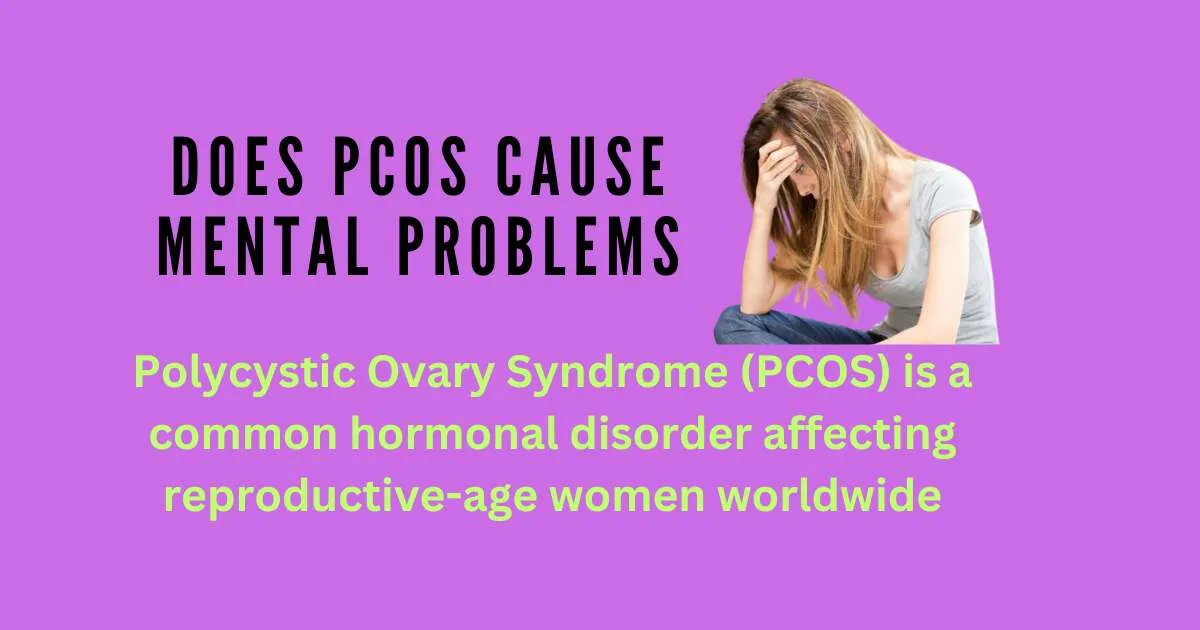Does PCOS cause mental problems? Understanding the link
Does pcos cause mental problems as polycystic Ovary Syndrome (PCOS) is a common hormonal disorder affecting reproductive-age women worldwide. Beyond its well-known physical symptoms, such as irregular periods and cysts on the ovaries, PCOS can significantly impact mental health. Let’s delve deeper into this connection and explore ways to manage both the physical and psychological aspects of PCOS.

1. Introduction to PCOS and its Prevalence
PCOS affects approximately 1 in 10 women of childbearing age, making it one of the most common endocrine disorders among women. While its exact cause remains unknown, factors such as genetics, insulin resistance, and hormonal imbalances play a significant role in its development.
2. Understanding the Link Between PCOS and Mental Health
Hormonal Imbalance and its Effects on Mood
The hormonal imbalance characteristic of PCOS, particularly elevated levels of androgens like testosterone, can impact mood regulation. Fluctuations in hormone levels throughout the menstrual cycle may contribute to mood swings, irritability, and emotional instability.
Psychological Impact of PCOS Symptoms
The distressing physical symptoms of PCOS, such as weight gain, acne, and hirsutism, can take a toll on mental well-being. Women with PCOS often experience lowered self-esteem, body dissatisfaction, and an increased risk of developing depression and anxiety disorders.
3. Research Findings on the Association between PCOS and Mental Health Issues
Studies have consistently shown a higher prevalence of mental health disorders among women with PCOS compared to the general population.
Depression and anxiety
Research indicates that women with PCOS are at a greater risk of experiencing depression and anxiety. The chronic stress of dealing with PCOS symptoms, coupled with hormonal fluctuations, can exacerbate these conditions.
4. Factors Exacerbating Mental Health Issues in PCOS Patients
Body Image Concerns
The visible manifestations of PCOS, such as weight gain and hirsutism, can lead to body-image dissatisfaction and contribute to the development of eating disorders and low self-esteem.
Social stigma and discrimination
Misconceptions surrounding PCOS, coupled with societal pressure to conform to unrealistic beauty standards, can result in social stigma and discrimination, further impacting mental health.
- Stigma refers to the negative perception that someone has about a person because of their mental illness. On the other hand, discrimination involves treating someone unfavorably because of their mental health condition.
- Social stigma and discrimination exacerbate mental health issues and prevent individuals from getting the help they require.
- It is essential to avoid stigmatizing people with mental illness by prioritizing seeing them as people first rather than labeling them based solely on their condition.
- Challenging stigma can be achieved by speaking out against negative or inaccurate comments about mental illness when they are around you.
Challenges in Diagnosis and Treatment
The complexity of diagnosing and managing PCOS, coupled with inadequate healthcare access and support, can exacerbate feelings of frustration and helplessness in patients.
Ways to treat mental health problems caused by PCOS
- Mental health issues due to PCOS can be addressed in two ways: by treating the underlying PCOS and by managing the mental health symptoms directly.
- Metformin is a generally prescribed medication for PCOS, aiding in blood sugar and insulin level control, facilitating weight loss, and restoring hormonal balance.
- Adopting a healthy, low-sugar diet and engaging in continuous exercise have shown positive outcomes for women with PCOS.
- Birth control pills are utilized by PCOS patients to regulate menstrual cycles and alleviate associated symptoms such as acne, mood swings, and excessive hair growth.
5. Coping Strategies for Managing Mental Health with PCOS
Lifestyle Modifications
Maintaining a healthy lifestyle through regular exercise, balanced nutrition, and adequate sleep can help alleviate PCOS symptoms and improve overall well-being.
Counseling and therapy
Seeking support from mental health professionals, such as therapists or counselors, can provide valuable coping strategies and emotional support for managing the psychological impact of PCOS.
Medication Options
In some cases, antidepressant or anti-anxiety medications may be prescribed to alleviate the symptoms of depression and anxiety associated with PCOS.
6. Importance of Seeking Professional Help
It’s essential for women with PCOS experiencing mental health issues to seek professional help promptly. A comprehensive approach, addressing both physical and psychological aspects, is crucial for effectively managing PCOS and improving overall quality of life.
Taking care of your physical and mental health is very important, and you don’t have to do it alone. Addressing your PCOS alongside depression, anxiety, or any other mental health concern begins with consulting your doctor.
Consider reaching out to a healthcare provider if you experience any of the following symptoms, which significantly impact your daily life or cause distress on a regular basis:
- Feeling of dread or doom upon waking up and facing the day
- Excessive sleeping or frequent napping
- Difficulty falling or staying asleep
- Persistent negative self-perception
- Struggles with enjoying personal relationships
- Avoidance of previously enjoyed hobbies or activities
- Generalized anxiety
- Panic attacks
- Paranoia
- Suicidal thoughts or actions
While depression, anxiety, and PCOS often coexist, mental health issues can stem from various causes. It’s essential to ascertain whether PCOS is the primary contributor to effectively addressing your symptoms.
Consider undergoing testing for PCOS, typically involving blood work and a basic ultrasound, if you experience:
- Recent weight gain, especially around the abdomen
- Challenges in weight loss despite dietary and exercise modifications
- Thinning or loss of hair
- more facial and body hair
- Irregular menstrual cycles
- Menstrual cycles exceeding 35 days
- Abnormally long or short menstrual periods
- Difficulty conceiving
- History of miscarriages
The association between PCOS and depression, as well as other mental health problems, is significant. If you are troubled by these challenges, you should know that you are not alone.
While it’s easy to attribute your symptoms to the constant stressors of life, there may be treatments available to help you get a sense of normalcy and resume your everyday activities. And if you’re unaware of your symptoms, seeking professional guidance can provide clarity and support.
Conclusion
PCOS not only affects physical health but also poses significant challenges to mental well-being. By understanding the link between PCOS and mental health and implementing appropriate coping strategies, individuals can effectively manage the psychological impact of this condition and lead fulfilling lives.
FAQs
- Can PCOS cause severe mental health issues? While PCOS itself doesn’t directly cause severe mental health issues, it can exacerbate existing conditions such as depression and anxiety due to hormonal imbalances and the stress of managing symptoms.
-
Is there a cure for the mental health problems associated with PCOS? There is no one-size-fits-all cure, but a combination of lifestyle modifications, therapy, and medication can effectively manage mental health symptoms in individuals with PCOS.
-
Are all women with PCOS at risk of developing mental health issues? While not all women with PCOS will experience mental health issues, they are at a higher risk compared to the general population due to the hormonal and psychological challenges associated with the condition.
-
Where can I find resources for managing mental health alongside PCOS? Resources such as support groups, online forums, and mental health professionals specializing in women’s health can provide valuable support and guidance for individuals navigating PCOS-related mental health challenges.

nice
thanks for comments